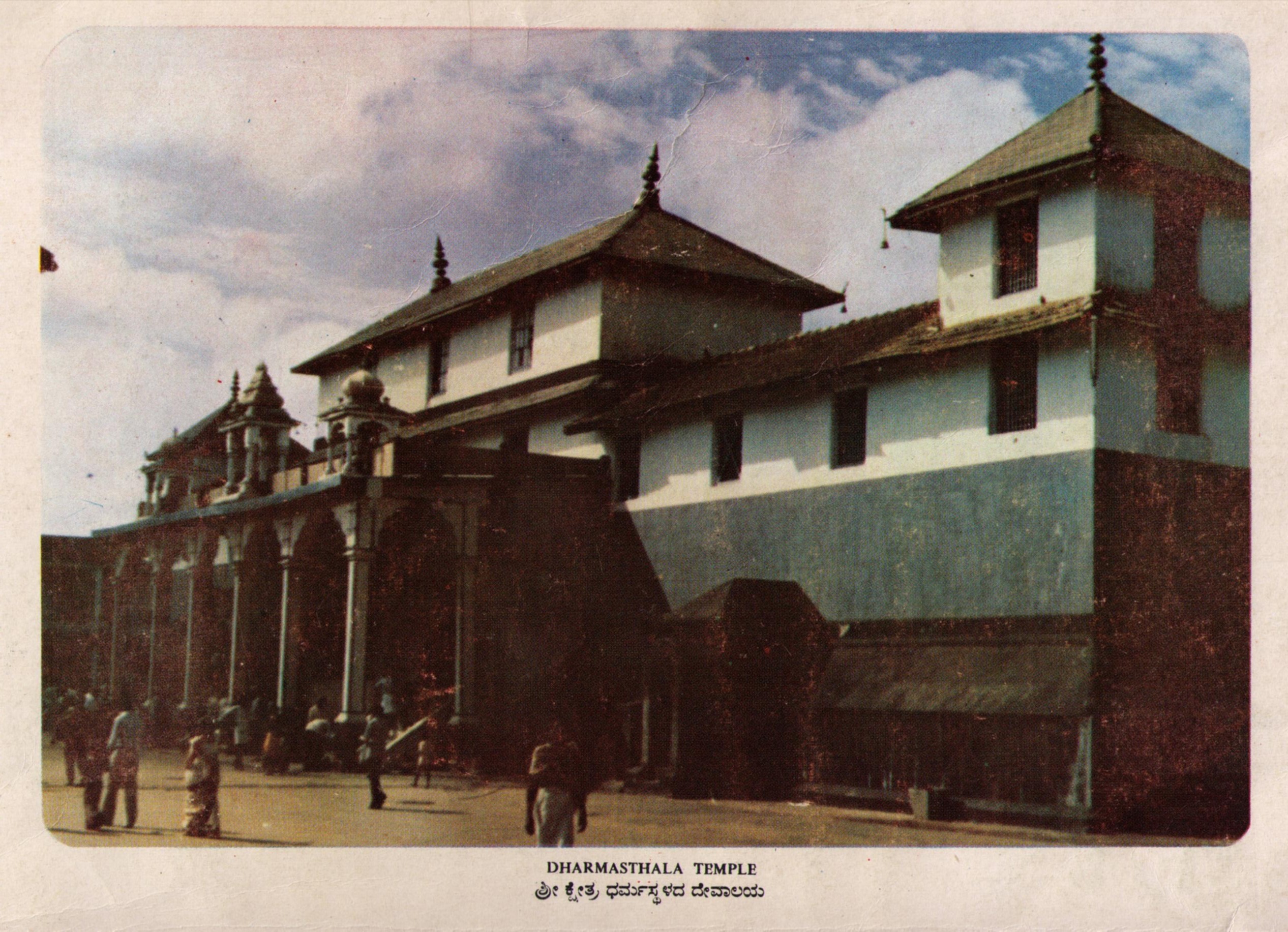The paper was published in February 1982 in Pratishthapana - A Commemoration Volume of the Pratishthapana and the Mahamastakabhisheka Ceremons of Bhagawan Bahubali at Dharmasthala, pp. 7-8.
Shri Dharmasthala has a history of several centuries. This is one of the most ancient institutions of South India. In the early days the place was called "Kuduma"; "Kodu" means "to give". Therefore, "Koduma" or "Kuduma" meant "the place of charity". Several hundred years ago a Jain chieftain, Birmanna Pergade lived in this place with his wife Ammu Ballalthi. Their residence was called Nelyadi Beedu. Near the Nelyadi Beedu, there was Shri Chandranathaswamy's Temple. The Pergade family comprised of pious and god fearing people. They were also very generous and hospitable. They led a simple and dharmic life and treated everybody with love and affection.
It is said that one day the guardian angels of Dharma assumed human forms and came in search of a place where dharma was scrupulously followed. With their retinue, they came to Nelyadi Beedu riding on horse and elephant. The Pergade was overjoyed to receive these hallowed and radiant guests and extended to them hospitality with due respect. The guardian angels were so pleased with the hospitality of their virtuous hosts that they immediately realised that they had arrived at the very abode of dharma which they had been searching for. That night the Pergade couple had an extra-ordinary dream in which the hallowed guests appeared and told them "O Pergade, we are not mortal beings, but powerful dharma-daivas. We have been pleased by your devotion, sincerity, hospitality and pious way of life. We will settle down here and help you continue this dharmic tradition for ever. Therefore, leave this Nelyadi Beedu to us and construct a house for yourself nearby. Let your dharmic life continue like this and be blessed with prosperity for generations to come." So saying, the dharma-daivas vanished. The next morning, the Pergade couple were surprised to see that their guests were not there and in that place they found swords and other regal weapons.

Pergade and his wife were thrilled to realise that their guests were not ordinary human beings, but divine visitors who had come there to bless them. They constructed another house nearby and started worshipping the dharma-daivas in the Nelyadi Beedu. They put up swing cots on which they kept burning lamps and incense. This practice is being continued even to today. The voice of the dharmadaivas made a deep impact on the Pergade couple who started scrupulously following the instructions given by their divine guests. They spent much of their time in worshipping God and serving the society.
After sometime, the dharmadaivas appeared again in their dreams and commanded thus: "O Pergade, we are four powerful dharmadaivas by name, Kalarkai, Kalarahu, Kumaraswamy and Kanyakumaii. You must build separate shrines for us at places pointed out by us and perform the traditional rituals called "Parva Nadavali," from time to time. You must choose two persons of noble birth and disciplined life through whom we will speak out our will. We will command Annappa Daiva to help you in carrying out our orders. Perform the traditional rituals from time to time without any lapse. Appoint four worthy persons to help you in this. Having full faith in us, carry out our orders according to your conscience and we will protect you and your family from all evils and bless you with long life, good health and prosperity. We shall spread the glory of this Kshetra far and wide and get abundance of offerings. We will see that your words are fulfilled and efforts crowned with success. Extend hospitality by providing food and lodging to all those who came here and carry out "Dana-Dharmas" without any distinction. Let this tradition be continued for ever by your successors. We will protect you and your family. Should you act against this behest, you shall suffer. Don't be afraid. Tread the righteous path and be peaceful" - With these words they blessed him and vanished.
The next morning Birmanna Pergade discussed this with his wife and visited "Badinade" which is the highest peak in that area pointed out by the dharmadaivas. There they built separate shrines for the dharmadaivas and Annappa Swamy and started performing the festivals and rituals like Parva and Nadavali, and sincerely continued the traditions of dana and dharma. Pergade invited brahmins for festive offerings. They suggested to Pergade that Gods also should be worshipped along with the daivas. While Pergade was worried over this problem, the dharmadaivas sent Annappa Swamy to bring from Kadri in Mangalore the linga of Shri Manjunatha which had been originally procured from Kashi and installed at the place where it now is. The Pergade couple were extremely pleased at the sight of this charming Shivalinga and built a temple around it. To the right of this, he also built shrines for the dharmadaivas and started performing the daily poojas and rituals and periodical festivals in a befitting manner. Thus in Kuduma the practice of worshipping Shri Chandranatha, Shri Manjunatha, the four dharmadaivas and Annappa daiva started simultaneously at different shrines with common festivals. The practice of worshipping the daivas at Nelyadi Beedu by Heggade alone continued. Along with this Heggade also makes annual offerings to his ancestors at this place.
Later during Devaraja Heggade's time, Shri Vadiraja Swamy of Sode Mutt, Udupi was invited to visit Dharmasthala. Vadiraja Swamy used to visit Subrahmanya often and had to pass near Kuduma on his way. The pious Devaraja Heggade who had a high regard for the Swamiji once approached him with a request to visit Dharmasthala on his way. The Swamiji gladly accepted and visited Kuduma. He was received with due honours by the elated Heggade. The Swamiji declined to have his "Bhiksha" (food) at this place because the idol of Shri Manjunatha was installed by the daivas. Then Heggade requested him to reconsecrate the linga himself and offered to make the necessary arrangements. The Swamiji was so much pleased by the traditional charities of this place that he named it "Dharmasthala" (Dharma = charity, sthala = place). Thereafter Kuduma came to be called Dharmasthala.
 Prof. Dr. S. Prabhakar
Prof. Dr. S. Prabhakar